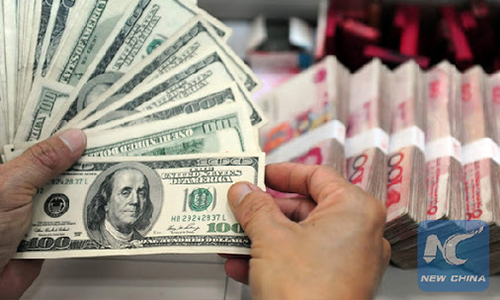HOME >> SOURCE
China's forex reserves fall amid debate over whether to unload US dollar assets
Source:Global Times Published: 2020/4/7 22:58:41

Yuan Photo: Xinhua
China's foreign exchange (forex) reserves declined more than expected in March, official data showed on Tuesday, as debate intensified among some economists in China about whether the country should unload dollar-denominated assets amid rising political tensions between the two countries and deepening economic woes in the US.Total forex reserves fell more than $46 billion in March to $3.061 trillion, which also represents a 1.5 percent decline from the beginning of the year, according to the State Administration of Foreign Exchange (SAFE). Some forecasts had put the number at around $3.097 trillion.
In a statement, SAFE attributed the fall in forex reserves to a strengthening US dollar and "major adjustments in asset prices in major countries." But it added that the country's forex market remains largely stable.
In March, the Chinese yuan fell by 1.27 percent against the US dollar, according to Reuters. China's forex reserves are at the lowest level in 17 months, Reuters reported.
The decline in March also came as the bilateral relationship between China and the US soared in the wake of the coronavirus pandemic, which continues to worsen in the US. As some US officials sought to blame Beijing for the virus and even suggested seeking compensation from China, some in China have been calling on officials to unload dollar-denominated assets to avert potential risks.
Ren Zeping, the outspoken chief economist for the Guangzhou-based Evergrande Group, has repeatedly warned of potential risks for China's massive dollar holdings, citing the political hostility from Washington as well as the US' decision to flood the market with cash to revive the virus-stricken economy.
"By over issuing the dollar, the US is chopping up its economic and financial costs [from the coronavirus pandemic] and passing them on to the world. It's financial repression due to the US dollar's position as a global reserve currency, accounting for 63 percent [of total forex reserves]," Ren wrote in an article on March 24, calling for increasing purchases of oil, natural gas, gold and other assets.
The US government has rolled out a $2 trillion stimulus package on top of an emergency interest rate cut and other measures taken by the Federal Reserve to support the US financial system. US politicians are reportedly discussing a new round of stimulus that could put another $1 trillion into the economy.
As the coronavirus ravages the US economy after failed efforts by the government to contain it, some US politicians and pundits have suggested that the US should seek compensation from China for damage caused to the US economy by the pandemic. Some have even pointed to China's massive holdings of US government debt.
While such comments sparked concerns among some in China over the safety of the country's forex holdings, some analysts advise against unloading US debt and dollar-denominated assets because there is no replacement and such a move could cause more damage.
"Any foreign assets held by a country could be exposed to political policy risks… But investment decisions involving trillions of dollars should not be affected by such extreme statements," Zhang Anyuan, chief economist with China Securities, wrote in an article for the Global Times on Sunday. "From the market perspective, if China's reserve volume drops significantly, it would cause panic."
However, Zhang said that China has in recent years made some adjustments to its forex holdings, including investing in non-US debt and non-US assets. While the EU and Japanese bond markets might be big enough to absorb China's massive assets, they have seen negative rates for years, he said.
SAFE, in its statement on Tuesday, warned that the global economy will face a severe impact and the financial markets will see intensified turmoil due to the coronavirus pandemic and geopolitics. But it maintained that China's forex reserves will remain stable given the improving domestic situation.
RELATED ARTICLES: